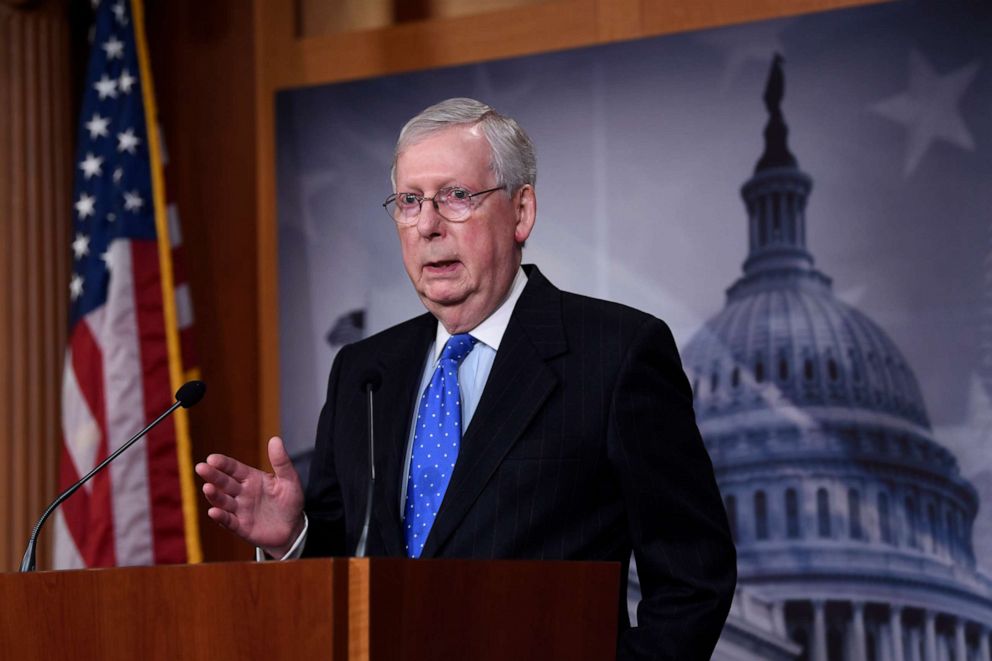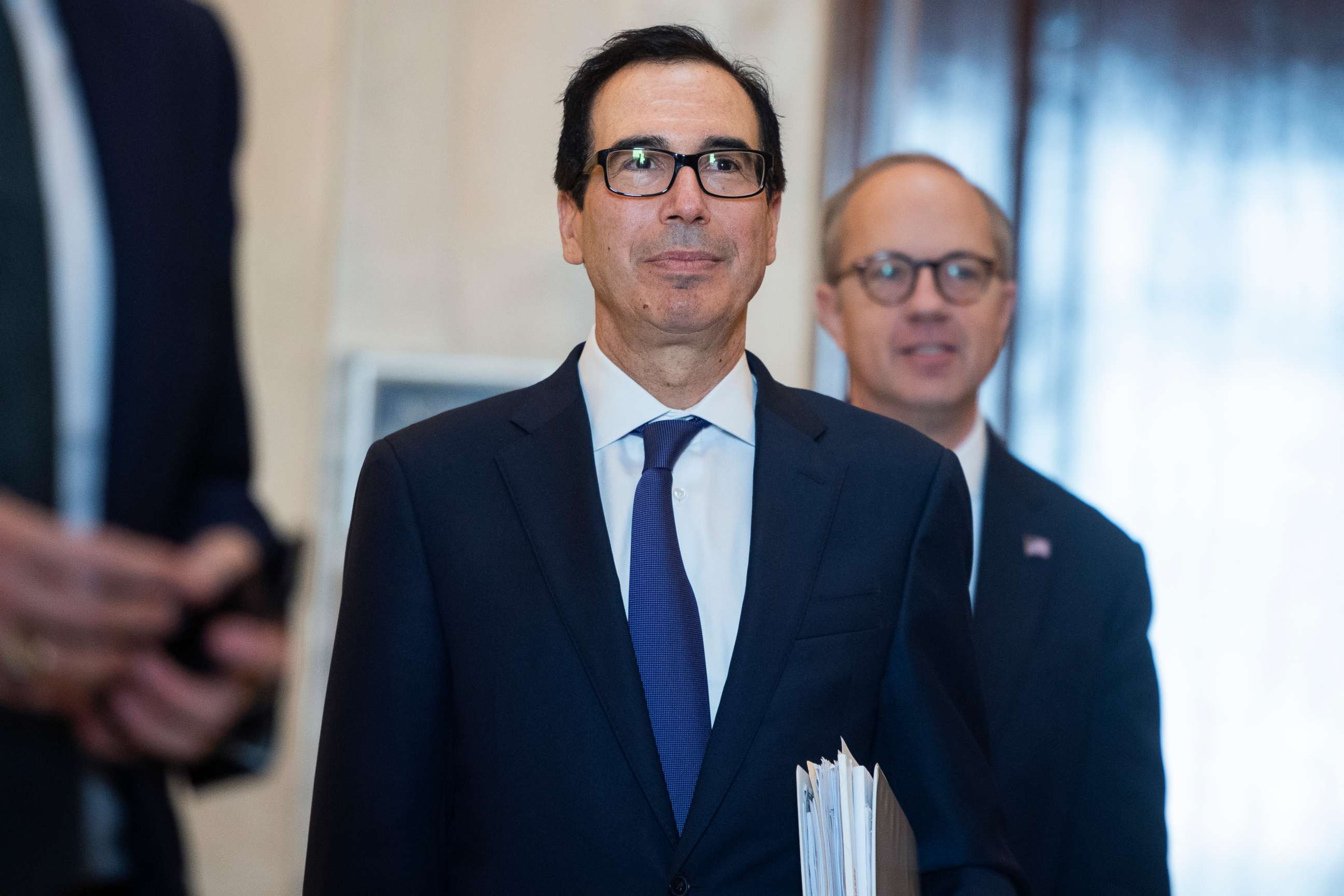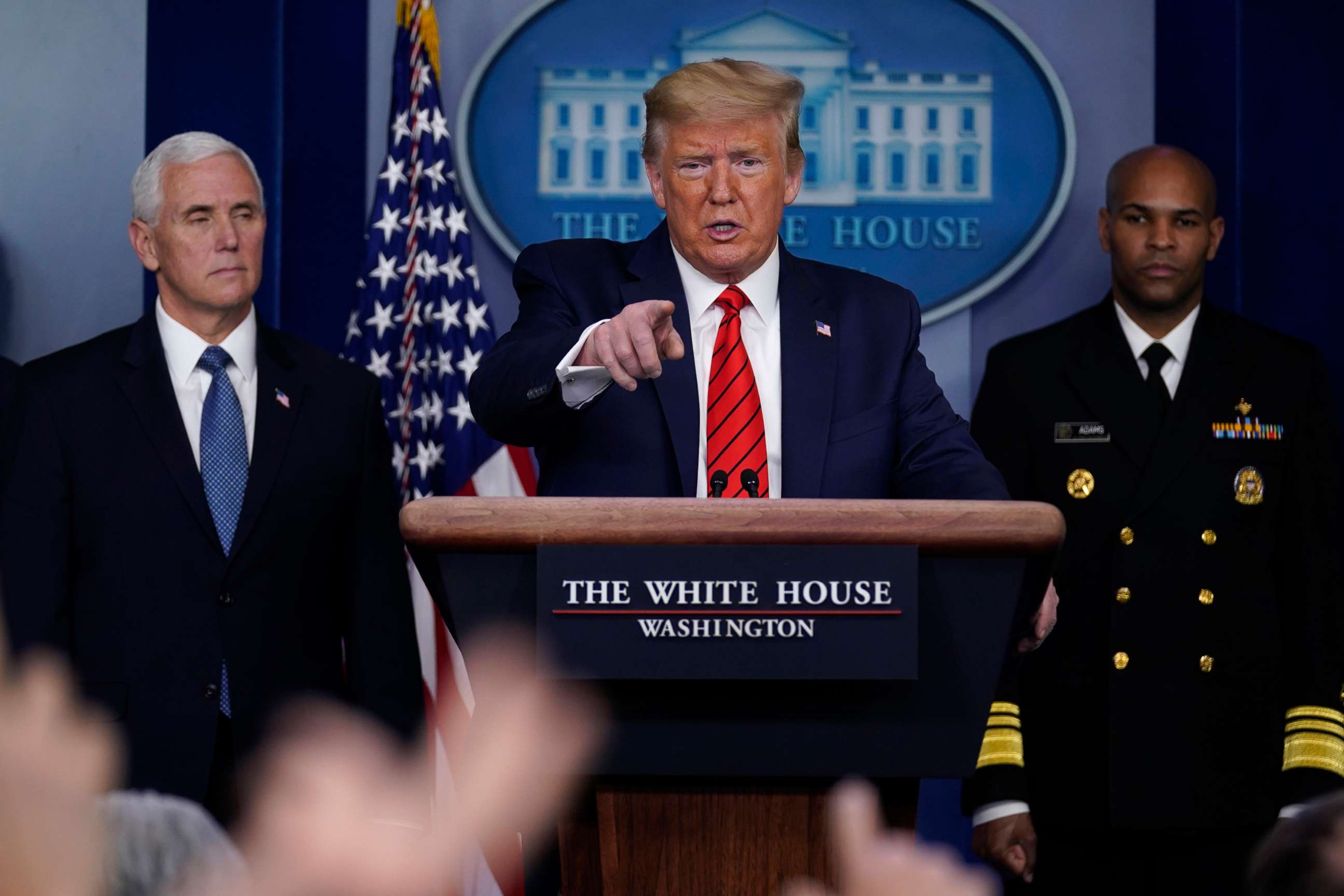Senate moving at 'warp speed' on $1T stimulus with $500B in checks to Americans
The measure, introduced Thursday, could be voted on by the weekend.
Senate Majority Leader Mitch McConnell, who promised Tuesday that his GOP members would move at "warp speed" to craft a $1 trillion COVID-19 economic stimulus package, introduced the bill Thursday afternoon.
One provision in the bill -- titled the "Coronavirus Aid, Relief and Economic Security Act," or CARES Act -- would send $1,200 checks to Americans making up to $75,000 per year, based on their fiscal year 2018 tax filing. The checks then scale down in amount until reaching an income cap of $99,000 per year, according to a senior administration official and a GOP official.
The amount doubles for married couples -- with $198,000 as the cap for them -- but only for those making less than $99,000. All of this is based on 2018 income.
It was not yet clear how the issue of sending two checks to Americans, as the administration wants, would be dealt with in the Republican-backed bill.

Indiana Sen. Mike Braun told reporters, "There's some discussion whether it should be one (check) and then wait and do another one to see whether it should be targeted."
House Speaker Nancy Pelosi and Senate Minority Leader Chuck Schumer, following the introduction of the CARES Act, released a joint statement, saying for the GOP to earn support from their Democratic counterparts, it would need to include provisions to protect workers.
"To earn Democratic support in the Congress, any economic stimulus proposal must include new, strong and strict provisions that prioritize and protect workers, such as banning the recipient companies from buying back stock, rewarding executives, and laying off workers," the statement said.
There was a spirited debate behind closed doors at Thursday's GOP lunch around whether or not to give Americans $1,200 checks to help cushion any economic blow from the virus' impact, this according to two GOP officials who asked to remain anonymous to discuss the private meeting.
South Carolina Sen. Lindsey Graham, a key Trump ally, told his colleagues that he would be working to convince the president and his incoming chief of staff, former Rep. Mark Meadows, not to send the checks -- arguing that Congress should focus on keeping existing payroll flowing to workers instead.
A senior administration official told ABC News, "We're heartened that a package is out, and we'll be engaging strongly on behalf of the president's interest in two checks."
McConnell indicated that a vote could come fairly quickly, warning senators not to venture far from the Capitol.

The GOP leader created three task forces modeled on the broad pieces of the administration’s initial $1 trillion proposal unveiled Tuesday.
Senators are focusing on small business aid, airline assistance, and economic relief-related proposals, including assistance for the embattled health care industry.
"Republicans hope, shortly, to have a consolidated position, along with the administration, and we intend to sit down with our Democratic colleagues, see what we can agree to, and I would recommend that senators stay around, close," said McConnell in a Senate floor speech Wednesday afternoon.
But crafting legislation always takes time, particularly complicated, large packages like this one and in a chamber that is narrowly divided among 53 Republicans and 47 Democrats where any final vote must garner the support of 60 members to pass. That gives Democrats leverage in any bipartisan talks.
"You still got to write it up, and, you got to pass it," John Thune, the Senate’s No. 2 Republican, cautioned reporters. "In the end, you got to get House support, get administration support. There's a lot of steps along the way here, but I think everybody has the motivation to get to a solution as quickly as possible and that's helping."
One thing that does appear to be on the side of swift action - legislative action during past crises is providing formulas for what’s happening now, like the federal infusion for airlines after the September 11th attacks devastated the industry and the 2008 recession that led to stimulus checks for Americans.

Treasury Secretary Steven Mnuchin, who is leading efforts on behalf of the administration, has already reached out multiple times to both Pelosi and Schumer this week in an effort to smooth the way, with aides to both leaders saying that the focus was on worker relief.
Sen. Schumer, D-N.Y., who unveiled a $750 billion Democratic stimulus proposal on Tuesday that speeds targeted aid to the health sector, expands unemployment insurance, aid to small businesses, and focuses assistance for child care and seniors, is expected to push for components of that plan in any bipartisan deal.
But there does appear to be overlap in proposals by each party.
Sens. Mitt Romney and Lindsey Graham said Republicans are also working on expanding unemployment insurance.
Tune into ABC at 1 p.m. ET and ABC News Live at 4 p.m. ET every weekday for special coverage of the novel coronavirus with the full ABC News team, including the latest news, context and analysis.
Romney, R-Utah, called for substantially increasing unemployment insurance "such that individuals who are unemployed and go to get unemployment insurance payments, don't just get the usual $375. But they get something much more substantial...so that we're able to keep people whole or nearly whole if they become unemployed."
"I want people to know that you're not going to be left without income," said Graham, R-SC, who does not favor the $1,000 stimulus checks proposed by the Administration Tuesday. "The unemployment system that exists is woefully inadequate for the circumstance that we're under. It was never designed for a pandemic. So we need to come up with an unemployment insurance structure that deals with layoffs due to a pandemic."
Small businesses already devastated by the virus' repercussions on the economy, could end up being crushed under the paid family and sick leave mandates in the just-passed stimulus bill that President Trump signed Wednesday, and lawmakers are anxious to speed relief to them in this current stimulus legislation.
"I think there’s broad, general agreement that small businesses will not be able to survive," Senate Small Business Committee Chairman Marco Rubio said.
Rubio, who is leading the small business GOP task force, is nearly finished with a $300 billion proposal that would provide federally-guaranteed loans to businesses to "help them meet payroll and operating obligations" for roughly six weeks. At the end of the six week period, or possibly eight weeks, the loan would be forgiven if it had been used to help workers, as was intended.
"We want to make sure that businesses that otherwise would be thriving and doing well, make it through this pandemic that we are enduring. We want to make sure their employees make it through this pandemic," said Sen. Susan Collins, R-Maine, who is working alongside Rubio on the task force.
Collins warned, "If we do not act to help the small business sector, I predict we will see massive layoffs and an inordinate number of small businesses shuttering their doors. They simply won’t be able to survive."

One administration proposal that has bipartisan buy-in is the $1,000 checks potentially going out in two tranches worth about $500 billion. Depending on how swiftly Congress acts, that money could start going out in early April, though one senior Administration official said the checks would go out "no later than late April."
If the country is still in a national emergency due to the pandemic, then the second round of checks would go out in early May.
Aid to the airline industry - a roughly $50 billion proposal -- is an area of concern among many lawmakers, though none are saying they would oppose it at this point. The concern is that the money not go to those at the top of these businesses; rather, it should be sent to workers and those at the bottom who desperately need assistance.
Senate Appropriations Committee Chairman Richard Shelby, R-Ala., is heading up the airline task force, and he has made clear that Congress will not be providing "bailouts" to the industry. None will be permitted to buy back stock to beef up their bottom lines, as was done in previous crisis.
The pressure is great for lawmakers to strike a deal now, and most seem ready to do that.
"We're dealing with an unprecedented external shock to an otherwise sound United States economy to try to save lives," said Sen. John Kennedy, R-La.
Graham too weighed in, explaining just how important growing the economy is.
"If we don't, we're going to get our ass kicked," Graham said. "So that's why I think we'll do it. I'll be the first one to kick myself."
What to know about coronavirus:
- How it started and how to protect yourself: coronavirus explained
- What to do if you have symptoms: coronavirus symptoms
- Tracking the spread in the US and Worldwide: coronavirus map




